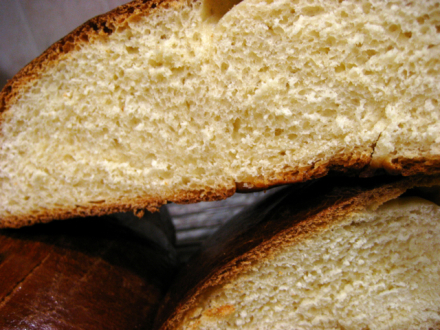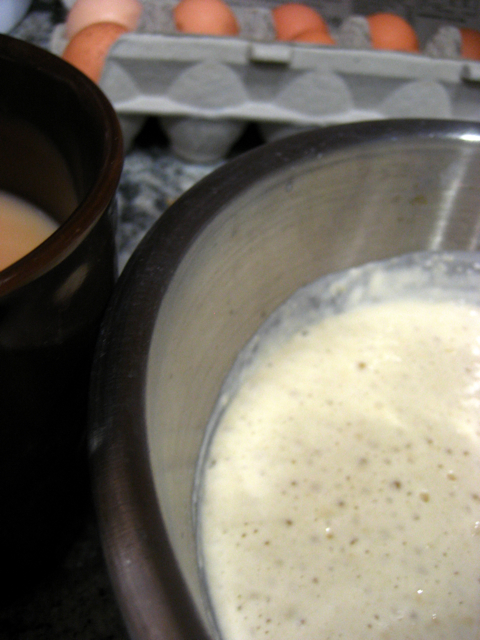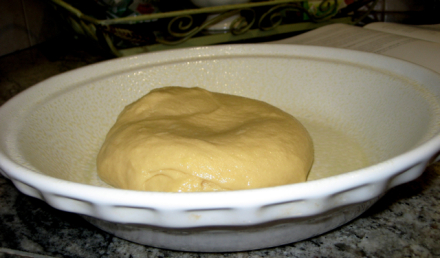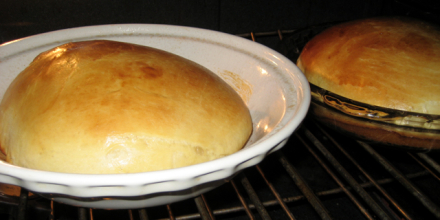
Don’t be fooled by the picture above. Peter Reinhart is kicking my butt. And I am morally opposed to using the word butt. That is, however, where I am finding myself on this one.
Despite its appearance, my Portuguese sweet bread was not a huge success.
Last Sunday morning I rose early and started the sponge while making some morning tea. As it bubbled away, I resumed our normal Sunday morning routines, getting us all ready for church. What could be better than this? I asked myself this as I padded around the apartment in my slippers: warm tea at my lips, my family together in the early hours of the day, homemade bread growing itself in the kitchen.

But when I wandered back into the kitchen at the appointed time to check the sponge and move on to Step Two of the recipe, the mixture had definitely not doubled in size. The cool humidity of the day was making the yeast sluggish. I decided to come back to it after I was completely ready to go, but when I did I could tell the sponge needed even more time. Which is exactly what I did not have. If I left the sponge working for the four hours we would be away, I would be putting bread in the oven around 2AM. I had to keep going with the recipe, doubled or not.
I donned a spirit of hope and quickly mixed in the next ingredients, kneaded with the help of the electric stand mixer while I put on shoes and lipstick, covered the dough and set off for church in the city.
What I returned to four hours later was a sad looking lump. My bread, it seemed, was suffering from failure to thrive. Already halfway through the process, I debated the future of these loaves: the oven or the trash bin? Mustering another burst of optimism, I decided to proceed with the recipe. The Bread Baker’s Apprentice offered little in terms of pictorial support for this particular recipe. It was a little bit possible, a very little bit, that this lumpy sadness was what the dough was expected to look like.
I divided the dough, shaped it, and left it for its final rise. Reinhart did not provide many pictures of this dough’s progress, but he did provide this description for the bread as it should be as you prepare to put it into the oven, “Proof… until the dough fills the pans fully, doubling in size and overlapping the edges slightly.”
Just take a look at the photo below.

This is the point at which I knew, and I apologize in advance for having to say it again, that my butt was kicked. And still, I could not resign myself to putting the dough into the garbage. Why? This last stage is called proofing. It is seeking the physical evidence that this bread is healthy and growing and working to its potential. Clearly my dough was lacking proof.
I think it is the scent. Yeast lives and you can smell it. It is difficult as a parent and a teacher to turn one’s back on life, no matter how sluggish it is. I heated the oven and popped the pathetically empty pie pans onto the rack.
And, as if out of gratitude for my persistence with them, the loaves did perk up a bit in the oven. The bread filled the pans and browned glowingly. And I ran around the apartment in a corresponding glow calling everyone to come and see. My bread was making strides toward success.

But there are things that cannot be rushed and despite my hopefulness and optimism and persistence and determination, I had pushed my Portuguese sweet bread sponge to be ready for the next stage before it truly was. And everything thereafter was lacking.
Here is what Peter says about the Portuguese sweet bread, “The bread will soften as it cools, resulting in a very soft, squishy loaf.” Soft and squishy—that is exactly what my bread was not. It was dry. The color was lovely, the scent was delightfully floral, the flavor had hints of citrus, and the texture was... dry. A heavy slathering of butter was not even remedy enough. WJ, the quintessential dough-belly left chunks of sweet bread on his plate at dinner, a sure sign of failure.
There are worse ways to spend a Sunday than hoping in some dough that is not ready to fulfill its potential. But there are things that cannot be rushed. Peter Reinhart is breaking me down. I think I am taking it slow but I am beginning to see that I don’t yet understand even the half of it.